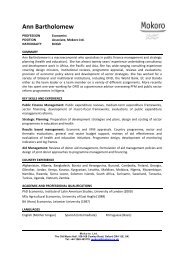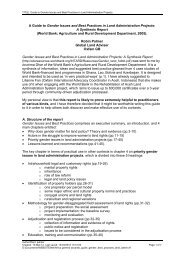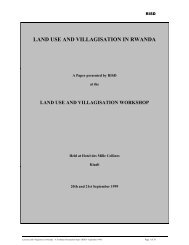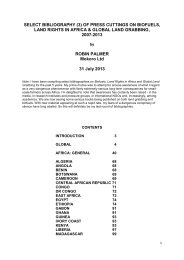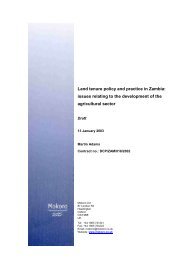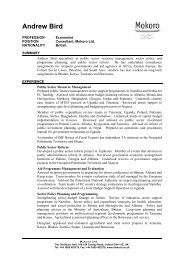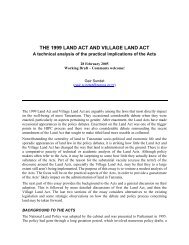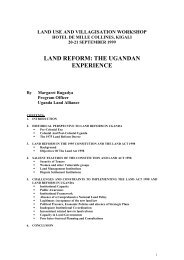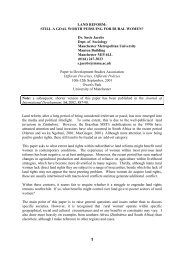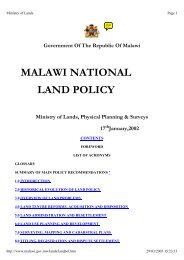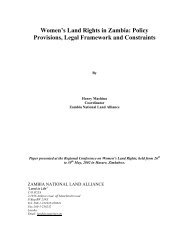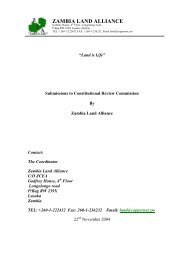Download - Mokoro
Download - Mokoro
Download - Mokoro
- No tags were found...
Create successful ePaper yourself
Turn your PDF publications into a flip-book with our unique Google optimized e-Paper software.
12farms in which they hold shares (Mayson 2003). High-risk and high-cost farming seldomdeclares profits, and members may have little say over the proportion which should bereinvested in production, and prefer short-term cash benefits to long-term investment –resulting in opposing interests among the shareholders (Tom 2006). And, because ofways in which gender inequalities structure employment and tenure relations on farms,women may not be able to opt for alternatives to equity schemes, or to control theresources that emanate. Further, until the recent emergence of ‘strategic partnerships’,many joint ventures did not detail specific plans to hand over control of operations tobeneficiaries over time.Contract farming is an important model for smallholder production as it provides ameans of bringing private sector support to resource-poor producers, in the form ofaccess to input, credit, training and a secure market for produce. Given the procurementrequirements of AgriBEE, processing industries in secondary agriculture are likely toseek further opportunities to enter into contracts with black producers. However, it is theterms of these contracts that are controversial as, where few major companies dominatea sector, they have substantial price-setting powers. This may mean that processors areable to push down prices and rely on self-exploitation by small producers, particularly ifthese growers are not organised (Mayson 2003).Box 2: Contract farming and the sugar industryThere has been substantial growth in the proportion of South Africa’s sugar crop beingproduced by small growers, particularly through contract farming arrangements incommunal areas. This now constitutes about 14% of the national cane crop, and about15% is still produced by the milling companies, dominated by Illovo Sugar Limited andthe Tongaat-Hulett Group, which over time are downscaling their involvement in primaryproduction. The first LRAD project, at Nkomazi in Mpumalanga, is a relatively rareexample where large commercial sugar estates were divided into 7 hectare plots forsmallholders to supply the Komati Mill. Sharecropping is being piloted at Mtunzini inKwaZulu-Natal, and a development trust established by the industry partners with theDepartment of Agriculture in research and development, and extension services. Thisexternalisation process assures future supply of raw material, and enables the millingcompanies to maximize downstream benefits, while also providing essential productionsupport to the growers. Inkezo Sugar Company, established by the sugar industry in2004, is now playing a role in transferring freehold land to black growers – bothsmallholders and medium-sized (70-100 hectares) farms, drawing on government landreform funding, and brokering loan agreements. Its target is to ensure the transfer of78,000 hectares, to bring the total freehold cane land owned by blacks to more than110,000, but by 2007 just five farms had been transferred.Source: Kleinbooi 2007bStrategic partnerships are a further type of joint venture and have, in most instances,been put in place precisely to prevent any change in land use, and are fast becoming thedominant way in which restitution claims on highly commercialised agricultural land arebeing settled (Derman et al 2006). These involve the transfer of full ownership tobeneficiaries, subject to an agreement that farming operations will be controlled by acompany in which they will be shareholders, along with a private sector partner whichwill be obliged to contribute capital and expertise and, possibly, a farm worker Trust.Most of the studies of successful land reform projects that have been showcased arePolicy Options for Land and Agrarian ReformProgramme for Land and Agrarian Studies, University of the Western Cape



